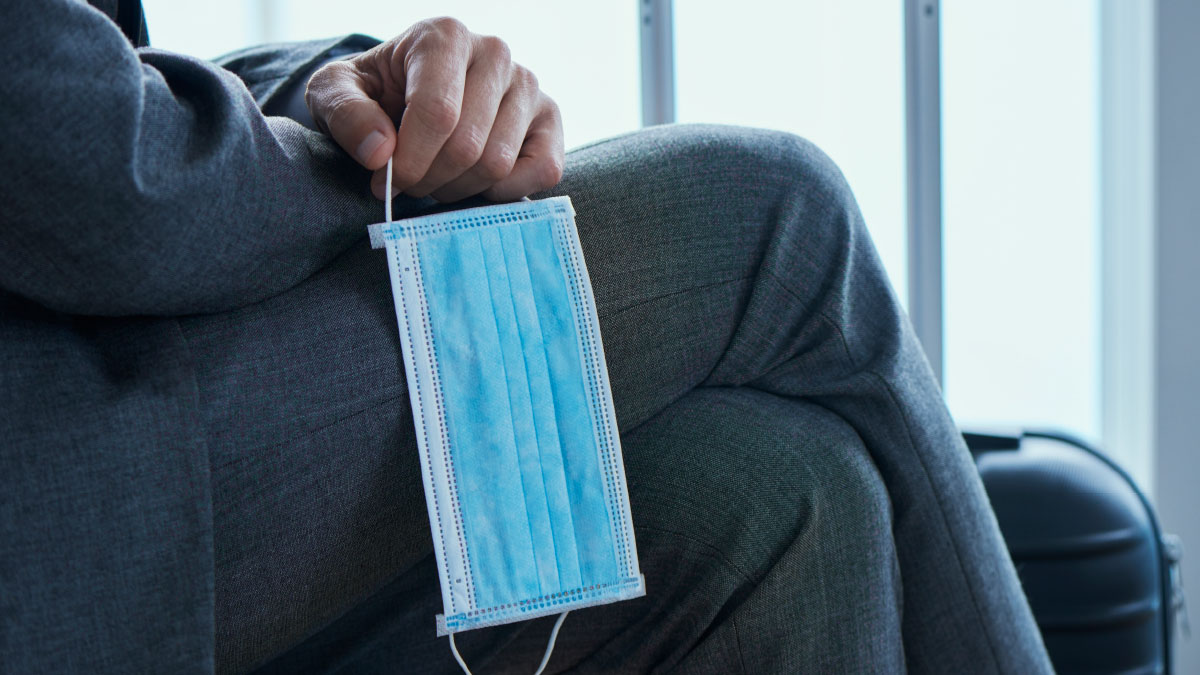
COVID and the Courts
A Look at Boulder County’s Response to the Pandemic
April 2021
Download This Article (.pdf)
Our courthouses are normally full of people and bustling with activity. Every day, hundreds if not thousands of people file through them to respond to criminal charges, obtain restraining orders, and resolve civil disputes. The public fills the hallways, courtrooms, jury rooms, and courthouse lunchrooms. This includes people involved with both ongoing cases and the continual daily flow of new business. Most are not there voluntarily. Even prospective jurors are compelled to appear. There are also a host of people needed to handle the People’s business. They include judges, clerks, courthouse administrators, court judicial assistants, prosecutors, defense attorneys, probation officers, community correction officials, and law enforcement.
So, what happened at our courthouses when COVID-19 started raging across the country? In Boulder County, stakeholders immediately got to work devising ways to respond quickly and creatively to the many challenges presented by the shape-shifting virus.
Initial Order Regarding COVID-19
On March 16, 2020, Chief Justice Coats of the Colorado Supreme Court issued an order to all Colorado state courts identifying what would and would not be suspended. The order stated, “the courts of this state can no longer continue normal operations and must for the immediate ensuing period operate on an emergency basis.”1 It suspended all jury calls for non-criminal matters through April 3, 2020. It ordered that certain classes of other matters such as proceedings related to protective orders could not be suspended. And for all the remaining matters that were neither designated essential nor prohibited, the order stated, “the Chief Judges of the various districts will retain the discretion to determine whether those operations or matters are necessary to prevent a substantial risk of imminent financial hardship or imminent risk to the health, safety or welfare of any individual or community at large.”2 Justice Coats also expressed his expectation that the chief judges “will make every effort to facilitate work from remote locations and to minimize or eliminate in-person proceedings and contact.”3
This order presented numerous challenges to the courts. Very little was known at that time about the virus or how to control its spread. The public was still being told—at that time—that wearing masks would not provide protection. And yet, the courts had to continue certain proceedings. They would have to devise a way to conduct them safely, and they would need to determine whether the need for certain other proceedings outweighed the risk they created. The courts were also concerned with ensuring they did not undermine the public’s confidence. Judges throughout the state recognized that they might undercut their credibility if their response to the crisis was inconsistent.
Immediate Response
Within days of the March 16 order, Boulder County’s judicial officers broke into teams to triage the situation. There was a domestic relations team, a civil team, a criminal team, and a county court team. These teams worked together to determine how to address both the old and continuing flow of new business until the courthouse could be reopened.
Task forces including the justice system’s stakeholders were quickly convened. In the criminal case context, the stakeholders included the offices of the District Attorney, Public Defender, Police Department, and Sheriff, which worked to determine how to conduct jury trials and what to do with criminal cases. These stakeholders met continuously and, even though their ethical and legal obligations were owed to different sides, they worked together with a high degree of collegiality to find a balance between the needs for public safety and public health. Many commented on how thankful they were to be working in a county with such a high level of professionalism and mutual respect and a willingness to work together to resolve problems. Because of this, they found a way to balance many of the competing concerns within one week of the March 16 order. Solutions included:
- revised arrest policies,
- revised holding policies,
- adjustments to bond procedures,
- new protocols for releasing people from jail and using personal recognizance bonds, and
- new policies on treating some arrest warrants as a summons to appear.
Chief Judge Bakke also established an open line of communications with other chief judges throughout the state. By the end of the first week, Chief Judge Bakke was working with Chief Justice Coats and the chief judges from every district in Colorado. They all grappled with balancing the essential functions of the courts against finding a way to manage the public health situation. They learned quickly that no one approach would work for all the districts because each had a unique set of needs. At the same time, consistency was important; widely varying approaches to addressing the conflicting concerns for the public’s health and the public judicial system could weaken the legitimacy of the courts. For example, serious access to justice questions might have been raised if the districts took widely varying approaches to jury trials.
Maintaining Operations
One of the first problems Boulder County encountered was determining how to keep everyone informed. The public, their counsel, and law enforcement had received notices to appear, summonses, and scheduling orders for months prior to the pandemic, and most of them had to be vacated. As a result, virtually everyone had to be notified that their appearances would be rescheduled to an unknown date in the future.
In the weeks immediately following the March closure of normal operations, only a skeleton staff worked in the courthouse. The small cadre of administrators and supervisors worked tirelessly to process the incoming filings and outgoing orders. Remaining in the courthouse alongside the skeleton staff were Chief Judge Bakke; Judge Mulvahill, who acted as the first assistant to the chief judge; and a rotating team of one district civil judge, one district criminal judge, one county court judge, and a “duty judge.”
The duty judge (affectionately referred to as the courthouse bouncer) was tasked with enforcing the rules at the courthouse entrance and deciding whose needs qualified them to enter. The duty judge sat every day by the phone in a small, windowless office near the front of the courthouse waiting to instruct members of the public who approached. Those who were turned away were told what they needed to do to address their obligations and cases. At times, the duty judge had nothing to do. Other times, the duty judge encountered a constant flow of people and would spend all day answering questions without the assistance of the usual structure or courthouse staff. It was not uncommon for the public to ask the duty judge for advice about unpaid bills or even housing situations and roommates. As time passed and the public learned that the courthouse was closed, the demands on the duty judge lessened.
Minimizing In-Person Activities
When not assigned to one of the slots in the courthouse rotation, the judicial officers worked remotely, doing their best to manage pleadings with written orders and researching newly arising legal issues, like how a pandemic affects a criminal defendant’s speedy trial rights and whether the courts could require people to appear remotely over objection. But they could not stop providing essential services. So, the judges and stakeholders quickly designed a plan that was consistent with both the March 16 order and other jurisdictions. Chief Judge Bakke issued a series of administrative orders to implement the plan. For example, on March 20, she ordered the Longmont Courthouse closed and directed all its business to the Boulder Justice Center. Chief Judge Bakke also postponed all district court jury trials from March 18 through May 15 and established who could and could not enter the Justice Center.4
Additional statewide changes included modifying court rules to safely reduce jail populations, installing technology for virtual audiovisual courtrooms, and waiving certain probation standards to limit in-person contact. The Supreme Court also allowed law school graduates to practice law before taking the bar examination and created a new remote solution to welcome new members of the profession who passed the bar examination in February.5
While short staffed and working under the initial plans, the courts also needed to develop plans for the longer term as hopes for a quick return to normal business faded. In the early days of the pandemic, the Boulder County judges prepared and scrapped numerous plans because things were changing so quickly. A concern became whether, and how, the public could access the courts remotely. The judges and staff struggled with determining what technology was needed to facilitate remote appearances and, simultaneously, they were designing plans for conducting business without knowing what access people had. As time passed, however, they found the problem was not as bad as they feared because technology was far more available among the public than believed.
On April 16, Justice Coats issued a new statewide order. In it, he amended the previous orders by directing that “no person shall be required to report for jury service in a state court before June 1, 2020.”6 On May 5, the Chief Justice amended his prior orders again and instructed that “certain judicial functions must be considered essential” and ordered that the essential functions “may not be altogether suspended, even where they cannot be provided remotely.”7 The essential functions included things like protection orders and hearings, bail hearings, probation revocation hearings, plea hearings for incarcerated individuals, juvenile detention hearings, dependency and neglect shelter hearings, and emergency mental health proceedings. The prohibition against summoning jurors was also extended to July 6, 2020.8 This deadline was extended again to August 3, 2020.9
Unique Challenges
A host of issues caused or aggravated by the pandemic created additional demands on the courthouse. For example, there was an increased demand for protection orders and resolution of custody conflicts arising from parenting disputes related to the health and safety of children.
The demands on the designated county court judge also did not slacken. Primarily because misdemeanors account for the largest portion of criminal cases, Boulder’s county courts traditionally have the largest number of people coming and going from their courtrooms. The county court also handles small claims cases, name changes, civil trials, replevins, and contempt of court actions. Many of the functions performed by the county court qualify as essential. Therefore, the county court judge who was charged with handling all the county court matters continued to have a large press of business.
Fortunately, the county court has an extraordinary team of prosecutors and public defenders who worked together to reschedule countless criminal cases. Hundreds of matters were deferred between March and June. The number of eviction proceedings was also reduced by the Centers for Disease Control and Prevention moratorium and orders from Colorado’s Governor.
But that did not resolve all the cases, and a fair number of in-person hearings continued to be held in the county court’s physical building. Most occurred in criminal cases and only when the hearings complied with public health orders. The decision to hold in-person hearings involved a balancing of efficiencies and the interests of justice against public health concerns and restrictions. And, whenever anyone indicated that they didn’t feel safe and there was no countervailing reason to hold an in-person hearing, the county court judge found the parties’ wishes to be a compelling reason to hold a virtual hearing.
Starting in June, most matters at both the district and county courts began to be addressed virtually. The county court, in part because of its larger numbers, frequency of unrepresented parties, and generally shorter hearing durations, continued to see a significant number of in-person appearances. In contrast, most district court hearings were virtual. Uniform protocols and procedures for virtual proceedings were developed and posted on the courthouse webpage.
Of course, the use of a virtual courtroom comes with its own challenges. People must be able to access the virtual courtroom and, even when they have access, connectivity issues can become a problem. Sharing exhibits can also be a problem. The exhibits are supposed to be shared with everyone before the hearing and, when that doesn’t happen, the court must balance the procedural interests against the interests of justice. Then there are the problems associated with displaying the exhibits during the hearing. Even when it works, the process is cumbersome and slows the hearing.
Speedy trial rights presented another unique challenge. Unless there is good cause for a delay or the defendant agrees to an extension, everyone charged with a crime is entitled to a trial within six months of their arraignment. The health concerns created by the pandemic collided head-on with these constitutional and statutory rights. Most defendants in Boulder waived their speedy trial rights and agreed to delay their cases. Those who did not got a priority setting or, if it was determined that a trial could not be conducted safely, findings were made that sufficient grounds existed to toll the speedy trial period. Between the initial March 16 order and March 3, 2021, only 13 jury trials were held in county court, and four were held in district court. A good number of criminal cases were postponed, resulting in a backlog that will need to be addressed post-pandemic.
Looking Ahead
As we get further into 2021 with COVID still with us, more matters may be placed on pause. Criminal trials will continue to be delayed for a while. In part because of the backlog of criminal cases, civil jury trials have been paused until July 19, 2021.10 And, as this fluid situation changes, the Boulder Chief Judge continues to work hard to keep Boulder County’s response consistent with the other jurisdictions in Colorado.
Despite these ever-changing conditions, the stakeholders have all been working together remarkably well. In some circumstances, they have been required to pivot and redesign the courthouse operations within less than 24 hours. Nevertheless, they continue to rally and work together to keep things moving. They have overcome many significant, unexpected, and everchanging challenges. And their collective efforts are a testament to our judicial officers, public servants, bar, and the very nature of the community in which we practice.
We don’t know when things will return to normal. But it’s clear that the women and men of the Boulder County Judicial System will meet any future challenges with dedication, creativity, and elan.
Notes
1. Order Regarding COVID-19 and Operation of Colorado State Courts (Mar. 16, 2020), https://www.courts.state.co.us/userfiles/file/Court_Probation/17th_Judicial_District/COVID-19%20Order%2016Mar2020.pdf.
2. Id. at 2.
3. Id.
4. Administrative Order 20-102 (Mar. 20, 2020), https://www.courts.state.co.us/userfiles/file/Court_Probation/20th_Judicial_District/AdminOrders/3-20-20%20Admin%20Order%2020-102%20PDF(1).pdf.
5. Chief Justice letter to all Colorado attorneys (Apr. 27, 2020), https://www.courts.state.co.us/userfiles/file/Media/COVID/Message%20to%20Attorneys%20FINAL%20.pdf.
6. Order Regarding COVID-19 and Operation of Colorado State Courts (Apr. 16, 2020), https://www.courts.state.co.us/userfiles/file/Court_Probation/17th_Judicial_District/Chief%20Justice%20Order%20Regarding%20Court%20Operations%2C%202020-04-16.pdf.
7. Updated Order Regarding COVID-19 and Operation of Colorado State Courts (May 5, 2020), https://www.courts.state.co.us/userfiles/file/Court_Probation/17th_Judicial_District/Chief%20Justice%20Order%20Regarding%20Court%20Operations%2C%202020-05-05.pdf.
8. Id.
9. Updated Order Regarding COVID-19 and Operation of Colorado State Courts (June 15, 2020), https://www.courts.state.co.us/userfiles/file/Court_Probation/17th_Judicial_District/Adams/Chief%20Justice%20Order%20Regarding%20Court%20Operations%2C%202020-06-15.pdf.
10. 20th Judicial District, Plan for Resuming Jury Trials Safely During COVID-19 Health Emergency (rev. Sept. 9, 2020), https://www.courts.state.co.us/userfiles/file/Court_Probation/20th_Judicial_District/Jury%20Trial%20Resumption%20Plan%209-9-20.pdf.


